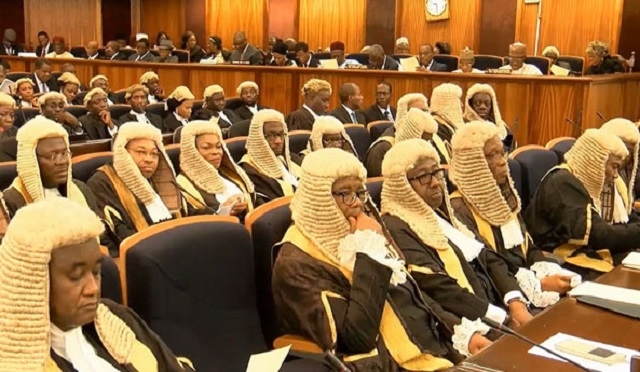The Hon. Justice Olabode Rhodes-Vivour, CFR, JSC (Rtd.), a former Justice of the Supreme Court of the Federal Republic of Sierra Leone and Nigeria, on Tuesday called for essential reform in the nation’s maritime sector.
Justice Rhodes-Vivour spoke while participating as Chairman of the 16th International Maritime Seminar for Judges organized by the Nigerian Shippers’ Council in collaboration with the National Judicial Institute in Abuja.
He noted that the maritime sector “constitutes a vital sector of any economy blessed with resources and recognized globally as one with enormous potential for facilitating and maintaining development – when properly harnessed.’’
The Honourable Justice sought a repositioning of the maritime industry as he noted that the sector offers the best alternative in terms of economy diversification.
Part of the repositioning, he said, was to ensure the sector achieves its full potential including supporting the exploits of the nation’s agricultural exports.
Expressing confidence that technology has the capability of checking corruption in the sector, Justice Rhodes-Vivour urged on the government to take “full advantage of technological advancement including automation with its potential to eradicate corruption and other negative activities in the maritime sector.”
He said: “Time has come for key steps to be taken to ensure the positioning of the Nigerian Maritime Sector to achieve its full potential including supporting the exploits of our agricultural exports.
“The radical reform process commenced in the sector years ago has resulted in an increase in economic activities including the Billion Dollar investment in free trade zones and the diversification of our Ports.
“The Nigerian Executive arm of Government must be commended for its support in the drive for a viable Maritime sector including its efforts towards achieving far reaching reforms in the maritime sector. Recent reforms include the appointment of an Economic Regulator of the Ports with a view to enhancing efficiency, creating a competitive atmosphere and improving on the economic viability of the Ports subsector.
“Indeed having an economic regulator during the critical global economic downturn is imperative in the drive to encourage transparency in economic activities, create accessibility, enhance revenue generation and boost the patronage of our seaports for imports and export trade.
“I call on both the Judiciary and the Legislature to support fully the reforms of this critical sector of our economy and give the necessary support to enable it carry out its regulatory roles. It is expected that the Economic Regulator will expeditiously and regularly come up with viable blueprints (whilst engaging fully with stakeholders) in the drive to achieve the maximum exploitation of the economic potentials of the maritime industry.
“Full advantage must be taken of technological advancement including automation with its potential to eradicate corruption and other negative activities in the maritime sector.
“Corruption is a major bane of development and is counterproductive to maximum productivity and efficiency. Stakeholders must ensure that all hands are on deck to get rid of any fraudulent and corrupt practices in the industry. Corruption militates against development. It increases the cost of doing business, limits economic growth, negatively impacts on social wellbeing, destroys and distorts processes and procedures, robs the government of legitimate revenue and gives the country a bad image globally.
“A corrupt free economy requires lucid, clear, simple and predictable rules governing all economic activities. All hands must be on deck to ensure smooth and consistent transition to technology including automation. Automation reduces negative activities and can be a remedy for increasing the ease of doing business by diminishing human contacts and increasing efficiency. The Economic Regulator will entrench transparency, accountability through the automation of our Ports.
“Government efforts towards repositioning the economy may be slow but we shall surely get there if we all join hands to move our economy forward. I am confident that all genuine efforts towards the improvement of the economy will continue to enjoy full support of the government.”
On the importance of the seminar, Justice-Vivour said there was the need for support to be “extended fully to the efforts of the Seminar aimed at continuing education and exposure of our judicial officers to the field of International Maritime Law and its related areas of Law in the interest of the overall development of our Nation.”
Commending the topics chosen for the Seminar, Justice Rhodes-Vivour continued that: “It is commendable that technology and ADR have been included in the topics in view of their importance in the 21st century as key instruments for Judicial and economic reform.”
He said he was delighted to note the presence of Chief Justices and other Judges and representatives from sister African nations; they included the Chief Justices of The Gambia, Ghana and Sierra Leone.
Justice Rhodes-Vivour added: “I do remember with nostalgia, my service as a Justice of the Supreme Court of Sierra Leone on secondment from Nigeria. You are all most welcome.
“I also welcome our Judges from all levels of Court. Indeed the extent of judicial participation underscores the importance of this Seminar. I also welcome our speakers who have selflessly given of their time and intellectual knowhow in contributing to this Seminar.”

































































